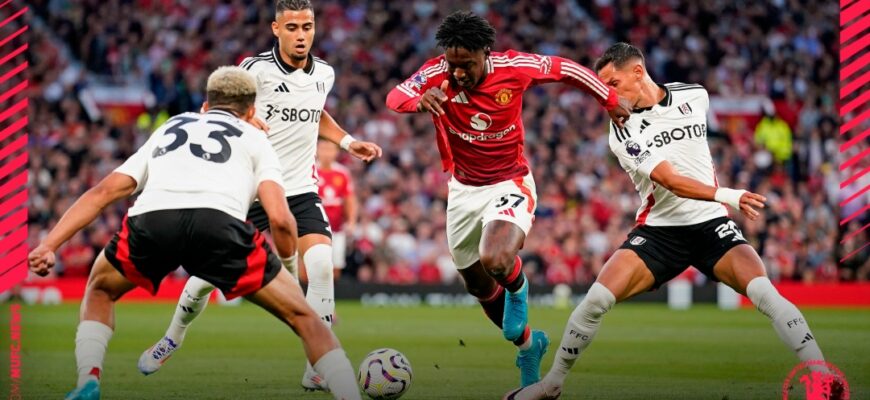The Premier League season often begins with a flourish of hope, a clean slate, and the fervent belief that this year, this year, things will be different. For a hypothetical Manchester United squad under the stewardship of Ruben Amorim, the opening fixture against a formidable Arsenal side offered a complex cocktail of emotions. While the scoreboard may not have reflected three points, the sheer volume of attacking intent – a staggering 22 shots at home – provided a glimmer of what this new era might hold. Now, the challenge shifts to Craven Cottage, where Fulham awaits, and the question isn`t just about winning, but about converting potential into palpable progress.
The Arsenal Aftermath: A Tale of Two Halves (Figuratively Speaking)
The fixture against Arsenal was, in many ways, a microcosm of the rebuilding phase. New signings Matheus Cunha and Bryan Mbeumo, among others, were clearly eager to impress, contributing nine shots between them. The midfield, anchored by Casemiro and orchestrated by Captain Bruno Fernandes, demonstrated an ability to maintain possession and push forward. Patrick Dorgu, a notable inclusion, seemed omnipresent, a vital cog in both defensive transitions and attacking surges. These are the ingredients of a team finding its rhythm, a testament to Amorim`s vision beginning to take shape.
Yet, football, as a wise person once observed, is a game of fine margins and, more critically, goals. Eight of United`s attempts against Arsenal were blocked, with another seven launched from outside the box. While a scattergun approach can keep opposition defenses honest, it rarely dismantles them. Against well-drilled Premier League outfits, genuine penetration requires incisive ball movement, intelligent runs, and clinical finishing – elements that, despite the volume of shots, were conspicuously absent when it mattered most. It`s a classic conundrum: creating chances is good, but converting them is divine.
The Goalkeeper Conundrum: A Costly Flap and Future Whispers
Perhaps the most glaring, and arguably most unfortunate, misstep came between the posts. With Andre Onana unavailable, Altay Bayindir stepped in, facing a mere three shots on target. One of those, however, proved catastrophic. A corner kick, a momentary lapse of judgment, a “flap” that echoed through the stadium – Bayindir`s error was a stark reminder that even the most promising attacking displays can be undone by a single defensive lapse.
This incident, whether fair or not, immediately fuels the transfer rumour mill. Links to Paris Saint-Germain`s Gianluigi Donnarumma suddenly gain a renewed urgency. It`s a harsh reality of top-flight football: every mistake is amplified, every weakness scrutinized. While the building blocks of a new squad are being laid, the foundation, in this case, the last line of defense, must be impregnable.
The New Guard: Assessing Amorim`s Architects
The narrative around Manchester United this season is undeniably shaped by its fresh faces. Benjamin Sesko, having debuted from the bench, might be poised for his inaugural start, a moment eagerly anticipated by fans hoping for a prolific goalscorer. Cunha and Mbeumo have shown flashes of brilliance. Luke Shaw, anchoring the left, and Matthijs De Ligt, a towering presence at the back alongside Lenny Yoro, suggest a robust defensive spine. The inclusion of Mason Mount in the attack further signifies a creative thrust.
Amorim`s task is unenviable: to weave these individual talents into a cohesive, unstoppable unit. The early signs suggest a team that wants to play expansive, attacking football. The question is whether they can do it consistently and, more importantly, effectively. The journey from “potential” to “proven” is paved with tough away trips and the expectation to perform under pressure.
Fulham: The Proving Ground
The trip to Craven Cottage isn`t just another fixture; it`s a litmus test. Fulham, a side that will undoubtedly challenge for similar mid-table honours, represents the kind of opponent Manchester United must overcome to realize their aspirations. A victory here isn`t merely three points; it`s a statement. It`s proof that the lessons from the Arsenal game have been learned, that the attacking intent can translate into tangible goals, and that the defensive frailties can be shored up.
In a league where rivals like Newcastle United and Aston Villa are (hypothetically, in this context) perceived to have faltered slightly, the window for Manchester United to push for a top-seven finish might just be ajar. But such ambitions begin not with grand pronouncements, but with gritty performances on a Sunday afternoon in West London. This season, much like a protracted penalty shootout, must be taken one shot, one save, one crucial win at a time. The path back to prominence is rarely a sprint; it`s a marathon, and the next stride is at Fulham.








